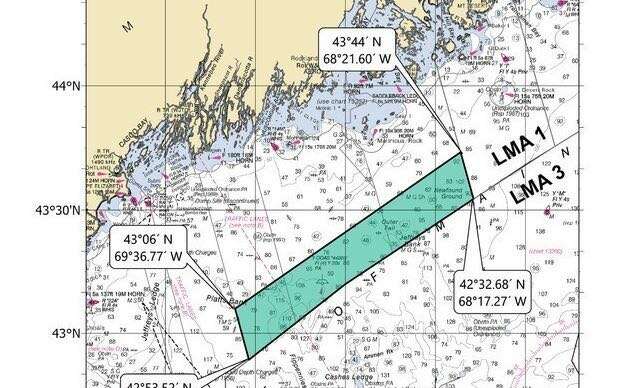
In whale protection effort, federal court reinstates lobstering ban off Maine coast
 Courtesy / NOAA
A North Atlantic right whale is shown breaching.
Courtesy / NOAA
A North Atlantic right whale is shown breaching.
A federal court of appeals on Tuesday reinstated a seasonal ban on lobster fishing across a broad swath of water in the Gulf of Maine.
The 1st U.S. Circuit Court of Appeals in Boston said that in weighing the industry hardships posed by the ban against the public interest of conserving the endangered North Atlantic right whale, the balance “tips heavily in favor of protected species.”
The closure of 967 square miles, about 12 miles off the southern Maine coast and dubbed the “LMA [lobster management area] 1 Restricted Area," was originally due to go into effect last October.

But with two days to spare, Maine’s lobster industry won an emergency stay on the ban when Trenton-based Maine Lobstering Union, Fox Island Lobster Co. of Vinalhaven and its co-owner Frank Thompson, and the Damon Family Lobster Co. of Stonington filed a motion against the federal Department of Commerce, National Oceanic and Atmospheric Administration and National Marine Fisheries Service.
The federal government has estimated 62 federally permitted fishermen from Stonington to Boothbay Harbor would be affected by the closure, which is scheduled to take place from October to January and includes the fishery’s most active period.
The union’s motion said double that number, 123 vessels, would be affected.
The seasonal closure bans vertical rope that stretches from lobster traps on the ocean’s bottom to surface buoys. Fishermen would be able to apply for special permits to test ropeless fishing gear in the area.
The closure off the Maine coast, and others off the Massachusetts coast, are part of a federal plan, announced a year ago, to reduce mortalities and serious injuries from fishing gear to North Atlantic right whales, humpback whales and fin whales. The plan also includes gear modifications that took effect May 1.
The plan has a goal to nearly eliminate risk to right whales by 2030.
The focus of the rule is on North Atlantic right whales because of their status as a critically endangered species, with fewer than 400 left in the world.
The goal is to reduce or eliminate the number of vertical lines the whales might encounter along their migration routes.
In the new decision, the court said the stay was issued in order to give the plaintiffs more time to explain errors in the federal government’s decision to institute the ban.
However, the decision says, “Even with more time and a target to attack, plaintiffs have failed to give us any reason to alter our initial analysis” and failed to provide data that show whales aren’t in the fishing “hot spot” at the designated time of year.
“That leaves for consideration the factors of irreparable harm, the balance of the equities, and the public interest,” the decision says.
Regarding the plaintiffs’ claim that the seasonal closure would present a major financial hardship to those who set traps annually in the restricted area, “we do not doubt that,” the decision says. But it adds, “We also do not doubt, though, that the loss of even one right whale caught in a thicket of trap lines in the LMA 1 Restricted Area would be irreversible.”
The decision notes that the federal agencies are guided by federal legislation that requires them to "halt and reverse the trend toward species extinction, whatever the cost."
“Although this does not mean the balance will always come out on the side of an endangered marine mammal, it does leave plaintiffs beating against the tide, with no more success than they had before,” the decision says.
Gov. Janet Mills, U.S. Sens. Susan Collins and Angus King and U.S. Reps. Chellie Pingree and Jared Golden issued a joint statement in response to the decision, which says, “Maine’s lobstermen have been unfairly targeted by a misguided court decision. Today’s ruling fails to acknowledge the substantial steps that Maine’s lobster industry has already taken to comply with gear change rules to protect the North Atlantic right whale.”
But conservationists hailed the decision.
“With an extinction crisis unfolding in real time, this decision is necessary for the recovery of North Atlantic right whales,” said Erica Fuller, a senior attorney at the Conservation Law Foundation.
Fuller said the area was selected due to a prevalence of dense lobster gear, heavy lines and whales for a few months of the year.
Jane Davenport, a senior attorney at Defenders of Wildlife, said the best path toward coexistence is to develop and deploy innovative fishing technologies that get ropes out of the water column while right whales are present.
Maine has a fleet of 4,800 individually owned and operated lobster fishing vessels that support tens of thousands of jobs.
According to data from the Maine Department of Marine Resources, 2021 was the most valuable year in the history of Maine's lobster fishery. At $725 million, the landed value for the fishery jumped by 75% over 2020, by far the single largest increase in value, year over year.
Not only was the 2021 value a record-setter, but the volume of landings continued a 12-year run in which harvesters brought to shore close to or more than 100 million pounds. At 108 million pounds, landings increased by more than 10 million pounds over 2020, an increase of more than 10%.










0 Comments